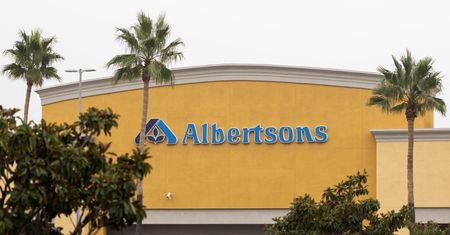By Trevor Hunnicutt
WASHINGTON (Reuters) – A Biden administration bid to block supermarket chain Kroger’s $24.6 billion deal to buy rival Albertsons may have outsized impact in two inflation-weary 2024 election battleground states, Nevada and Arizona.
The grocers have dozens of stores in the Western states, and people who live there already pay some of the biggest grocery bills in the country.
Democrats are hoping to seize on tanking the merger as an election-year triumph, courting unions fearful about losing jobs and easing Americans top concern about U.S. President Joe Biden’s re-election: anger that prices are too high.
The U.S. Federal Trade Commission is joined in its lawsuit to block the deal by eight states, including Arizona and Nevada, who argued it would boost grocery prices for millions of Americans and increase the combined chain’s leverage in pay negotiations with workers. Both states have Democratic attorneys general.
Even before the lawsuit, Biden and the White House had railed against supermarkets and other businesses for holding on to too much profit, selling smaller products for the same price or tacking on junk fees.
Biden economic adviser Jon Donenberg said in a statement on Monday that, while the White House could not comment on pending litigation, Biden believes that corporations need to be “checked by healthy competition” and that “Biden is committed to lowering grocery costs for families using every tool at his disposal.”
The Democratic president’s campaign regards both Arizona and Nevada as among the most intensely competitive in November’s election, where a combined 17 Electoral College votes are up for grabs toward the 270 needed to win against likely Republican opponent Donald Trump. Biden’s and Trump’s campaigns declined to comment.
In Nevada, where Census data shows families spent the second-most on groceries in the country at $295 per week, Biden has been trying to woo unions and Latino voters after winning the state by narrow margins in 2020.
The dynamic is similar in bordering Arizona, where grocery bills are also above the national average. That state is also home to one of the more competitive 2024 races that will determine control of the Senate.
“We shouldn’t allow billion-dollar corporations to rake in profits while Arizonans suffer from rising food costs,” said Democratic Representative Ruben Gallego of Arizona, who is running for the Senate seat.
The grocers have argued the deal’s collapse would only help non-unionized retailers like Walmart, and undermine plans by a combined retailer to cut prices.
But the United Food and Commercial Workers International Union, which represents more than 1 million workers in the grocery and other industries in North America, opposes the deal. Biden has courted the UFCW and they endorsed his re-election bid last year.
U.S. food prices have risen by 25% over the last four years, and while food inflation is showing signs of cooling off in 2024, grocery bills have become a growing concern for shoppers – and voters.
The White House has said that while eggs and milk are a tiny share of what consumers spend in a given month, people pay very close attention to them.
A White House analysis of Census data shows food-and-beverage retailers’ revenues as a share of their costs have risen sharply from before the pandemic to a level not seen since the mid-2000s, a measure that they say more directly tracks retail mark-ups.
(Reporting by Trevor Hunnicutt; Editing by Alistair Bell)

